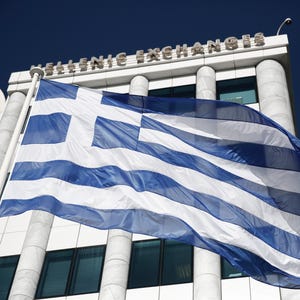Greece's new Prime Minister Alexis Tsipras said Monday that eurozone
debt was a crisis for the whole continent as he launched a European
tour to rally support for his campaign for debt forgiveness.
Video provided by AFP
Newslook
WHAT'S THE LATEST DEVELOPMENT?
Late Wednesday, the European Central Bank, one of Greece's three main creditors for its $272 billion bailout — the European Commission and International Monetary Fund complete the so-called "troika" — piled on the pressure after it said Greek banks would no longer be able to access ECB credit by using Greek government bonds as collateral. Restricting Greece's access to this type of credit, although engineered as part of its bailout deal, is significant because it sends a massive signal from Greece's lenders to Tsipras that they are determined to force the country to reach a compromise about any new potential debt terms.
STOCKS THURSDAY: How U.S., other markets are doing
WHAT'S THE BIG RUSH?
Greece is due to receive the final tranche of its loans from the "troika" on Feb. 28. Ahead of that, Tsipras and Yanis Varoufakis, his colorful new finance minister (he shuns ties and rides a motorcycle to cabinet meetings) said they would refuse that final $8 billion installment unless Greece could get more equitable conditions that would allow it to trim harsh austerity measures and start spending again. Now that the ECB has moved to block Greece's bank's from accessing credit linked to government bonds, effective Feb.11, yet more financial force is being exerted on Greece's leaders to get a deal done before the end of the month.
WHAT ARE THE GREEKS COMPLAINING ABOUT?
An economy and livelihoods in shambles, basically. Although Greece technically exited its six-year recession in the middle of last year when it saw modest economic growth, its GDP is now about a quarter below where it was at the start of the financial crisis in 2008. Unemployment has cratered to 25%, rising to 50% for the young. Over 44% of Greeks in 2013 had income that fell below the official poverty line ($756 per person, per month), according to estimates by the Public Policy Analysis Group of the Athens University of Economics and Business. Its public sector has been decimated and many have no access to health insurance. A study by the BMJ Open medical journal found that suicides in Greece hit their highest level in 30 years in the wake of the "troika"-mandated austerity programs. Total suicides rose 35% in 2011, the year severe cutbacks were first introduced.
ARE MARKETS WORRIED?
They are down sharply in Athens (as much as 10% before recovering slightly) on Thursday but more generally they are unsteady and a little confused rather than overtly fearful. In intraday trading, Germany's DAX index shed 0.1%, Britain's FTSE 100 was down 0.5% and France's CAC 40 declined 0.4%. But stock futures pointed to gains on Wall Street and the euro was actually up against the dollar by 0.2%. That's not to say investors aren't concerned about a Greece-creditor collision course. "This is clearly the ECB signaling to the Greek government: You're going to have to talk to the troika and get a deal," Jacob Kirkegaard, senior fellow at the Peterson Institute for International Economics, told the Associated Press. "Otherwise, really bad things are going to happen." Kirkegaard was commenting after Varoufakis met Wednesday with ECB President Mario Draghi.
WHAT NOW?
Varoufakis met Thursday with Wolfgang Schaeuble, Germany's finance minister, a major critic of Greece's new government. Schaeuble represents the view that Greece has not done enough to push through structural reforms such as privatizing major infrastructure that would allow it — the idea is — to raise funds and pay down its debts. "We didn't discuss Greece's debt schedule and haircut. We discussed how to end this seemingly never-ending crisis," Varoufakis said after the two men talked. Meanwhile, Greece is adamant that it will keep on keeping on with its agenda to get rid of harsh austerity measures crippling the economy. Greece said it won't be blackmailed by its lenders and neither it is blackmailing. That will be further tested as Greece's parliament reopens and starts debating new legislation. So it's High Noon in Athens and Brussels.

No comments:
Post a Comment